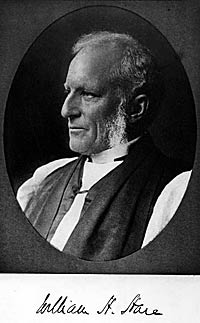Readings:
Psalm 121
Isaiah 40:3-11
Romans 10:12-17
John 4:7-15Preface of Advent
[Common of a Missionary]
[Common of a Pastor]
[For the Ministry II]
[For the Mission of the Church]
PRAYER (traditional language)
Holy God, who didst call thy servant William Hobart Hare to proclaim the means of grace and the hope of glory to the peoples of the Great Plains: We give thanks to thee for the devotion of those who received the Good News gladly, and for the faithfulness of the generations who have succeeded them. Strengthen us with thy Holy Spirit, that we may walk in their footsteps and lead many to faith in Jesus Christ; who liveth and reigneth with thee and the Holy Spirit, one God, now and for ever. Amen.
PRAYER (contemporary language)
Holy God, you called your servant William Hobart Hare to proclaim the means of grace and the hope of glory to the peoples of the Great Plains: We give you thanks for the devotion of those who received the Good News gladly, and for the faithfulness of the generations who have succeeded them. Strengthen us with your Holy Spirit, that we may walk in their footsteps and lead many to faith in Jesus Christ; who lives and reigns with you and the Holy Spirit, one God, now and for ever. Amen.
This commemoration appears in A Great Cloud of Witnesses.
Return to Lectionary Home Page
Webmaster: Charles Wohlers
Last updated: 16 March 2019
WILLIAM HOBART HARE
BISHOP OF NIOBRARA, and of SOUTH DAKOTA, 1909
 William
Hobart Hare (1838-1909) was an American bishop of the Protestant Episcopal
Church, son of George Emlen Hare. He was born at Princeton, N. J., and
was educated at the University of Pennsylvania. He preached in Philadelphia
until 1870, was for three years the general agent of the foreign committee
of the board of missions, and in 1872 was elected Missionary Bishop of
Niobrara. He came to Yankton, Dakota Territory in 1873 and his diocese
in 1883 was extended to include all of the Dakota Territory. He wrote
several pamphlets on missionary work in the West.
William
Hobart Hare (1838-1909) was an American bishop of the Protestant Episcopal
Church, son of George Emlen Hare. He was born at Princeton, N. J., and
was educated at the University of Pennsylvania. He preached in Philadelphia
until 1870, was for three years the general agent of the foreign committee
of the board of missions, and in 1872 was elected Missionary Bishop of
Niobrara. He came to Yankton, Dakota Territory in 1873 and his diocese
in 1883 was extended to include all of the Dakota Territory. He wrote
several pamphlets on missionary work in the West.
He was one of the leading missionaries in America and was called "the Apostle of the West" for his dedicated work in the rural Dakotas among pioneers and Native Americans.
— from Wikipedia
A biography of him, plus other works by and about him, are online, thanks to Project Canterbury